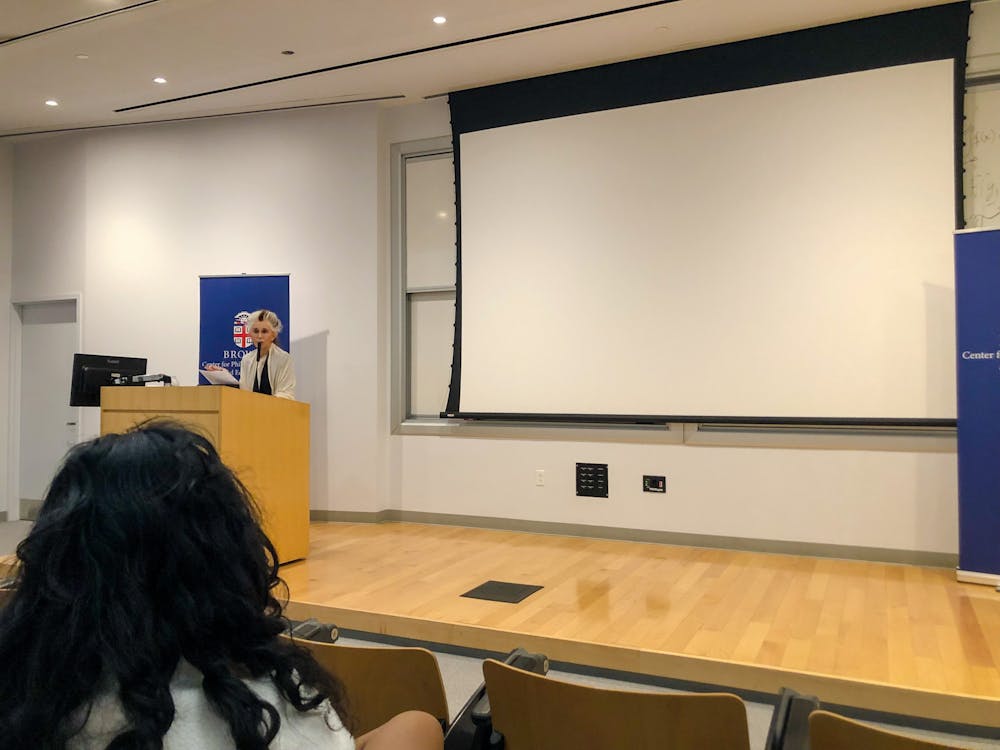Content warning: This article includes several mentions of rape and sexual assault.
Legal scholar and author Catharine MacKinnon critiqued the legal construct of consent in a lecture entitled “Sexual Assault and Inequality: A Critique of Consent” hosted by the Center for Philosophy, Politics and Economics Friday evening.
In her lecture, MacKinnon discussed how legal definitions of consent can reinforce gender normativity and place a burden on victims, especially in the courtroom. MacKinnon drew the lecture’s content from her 2016 essay “Rape Redefined,” noting that Friday’s event marked the first time it was delivered as a lecture.
In the essay and lecture, MacKinnon proposed a revised definition of sexual assault and rape law. “Sexual assault or rape is a physical invasion of a sexual nature under circumstances of threat or use of force, fraud, coercion, abduction or the abuse of power, trust or a position of dependency or vulnerability,” she said.
In her definition, force is not only physical, but may also include the leveraging of privilege surrounding “age, mental and physical disability, immigration, status, sex, gender, race, class, sexuality (and) caste,” she said.
MacKinnon then critiqued the application of consent terminology in criminal law. She noted that the term consent is rarely used to describe “passionate” and “enthusiastic” interpersonal sexual interactions, but is often used to defend and justify sexual encounters with power imbalances. MacKinnon described this as a difference in the social and legal realities of consent, where sexual encounters with power imbalances are defined as consensual in a legal context due to inefficient and underenforced legislation surrounding consent. Legally accepting sexual interactions as consensual does not remove their power imbalances, but rather just “makes them tolerated,” she said.
While consent is subjective, laws typically define consent according to its “external expression,” MacKinnon said. As a result, consent becomes “the reason that the alleged victim is put on trial.”
In court cases surrounding rape, “the focus is relentlessly on (the victim),” she said, “and in particular (on) what she does with her body, on what she was thinking, on her dress or what her prior statements or prior experiences were.”
These cases examine “what she is doing with herself … rather than what (the perpetrator) was doing with his power,” she added. MacKinnon emphasized the importance of considering power dynamics as part of force when consent is discussed in a legal context.
Keelin Gaughan ’25 and Fengyu Seah ’25, who attended the lecture, praised MacKinnon’s legal critique. Gaughan described the event as “an enriching experience.”
Gaughan and Seah both attended the event after reading MacKinnon’s work in classes and found the lecture relevant to a university audience.
“We read some of MacKinnon’s work in the GNSS 0120: ‘Introduction to Gender and Sexuality Studies’ course that I took last year, so I was familiar with her work going in,” Gaughan said. “I really admire her writing. I also think that the topic of the lecture was very relevant to university life.”
“I took a class last semester called POLS 1355: ‘Women in Politics,’ and we had read one of MacKinnon’s articles, and I remembered really enjoying (it),” Seah said.
Consent “is simultaneously a very important issue and one that we run up against throughout our lives,” Seah added. “The framework of consent is something that’s especially relevant to the college campus.”
Gaughan underscored MacKinnon’s argument about incorporating considerations of power imbalances in legal discussions of force.
“I think the most powerful part of her lecture was the critique of how the rhetoric surrounding consent is very unclear in legislative contexts,” she said. “I found her idea of using force as a definition and an all-encompassing term to account for power dynamics and inequality very compelling.”

Neil Mehta was the editor-in-chief and president of the Brown Daily Herald's 134th editorial board. They study public health and statistics at Brown. Outside the office, you can find Neil baking and playing Tetris.





